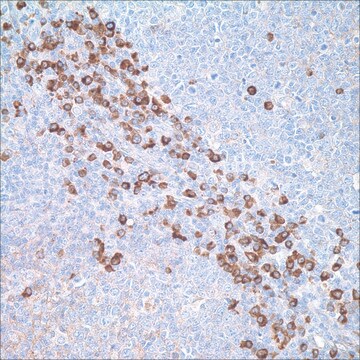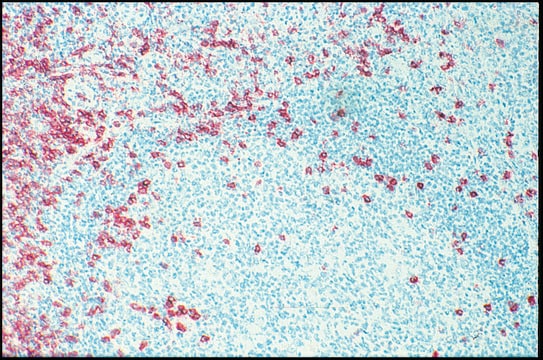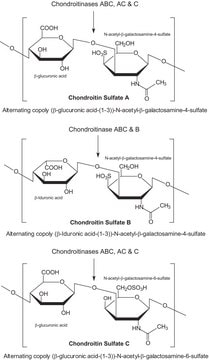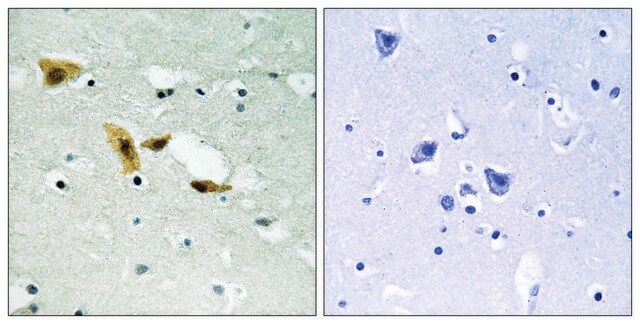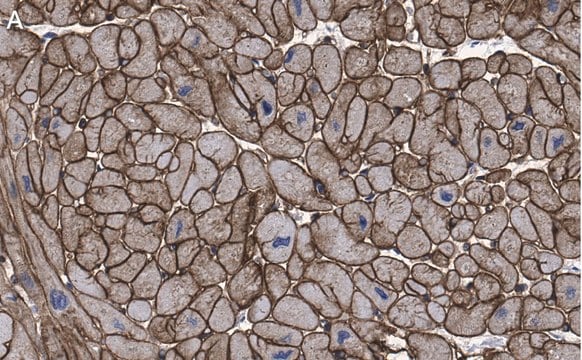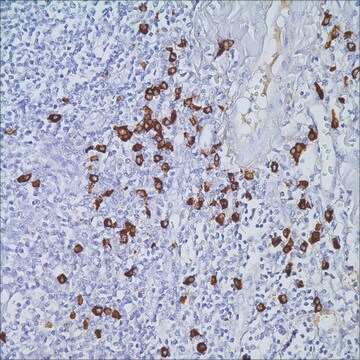All Photos(1)
About This Item
UNSPSC Code:
12352203
eCl@ss:
32160702
NACRES:
NA.41
clone:
polyclonal
application:
ICC
WB
WB
species reactivity:
human
technique(s):
immunocytochemistry: suitable
western blot: suitable
western blot: suitable
citations:
5
Recommended Products
biological source
rabbit
Quality Level
antibody form
purified immunoglobulin
antibody product type
primary antibodies
clone
polyclonal
species reactivity
human
manufacturer/tradename
Upstate®
technique(s)
immunocytochemistry: suitable
western blot: suitable
isotype
IgG
GenBank accession no.
UniProt accession no.
shipped in
wet ice
target post-translational modification
unmodified
Gene Information
human ... ATRIP(84126)
General description
Antibody recognizing ATR-Interacting Protein
Specificity
ATRIP
Immunogen
GST fusion protein corresponding to residues 1-181 of human ATR interacting protein (ATRIP)
Application
Detect ATRIP with Anti-ATRIP Antibody (Rabbit Polyclonal Antibody), that has been shown to work in WB, ICC.
Research Category
Epigenetics & Nuclear Function
Epigenetics & Nuclear Function
Research Sub Category
Cell Cycle, DNA Replication & Repair
Cell Cycle, DNA Replication & Repair
Quality
Routinely evaluated by immunoblot on modified RIPA lysates from HEK293, HeLa and U20S cells
Target description
85kDa
Physical form
70% storage buffer (0.05M Tris-glycine, 0.025M sodium phosphate, pH 7.4, 0.15M NaCl, 0.035% sodium azide) and 30% glycerol
Format: Purified
Protein G Purified
Storage and Stability
2 years at -20°C
Legal Information
GenBank is a registered trademark of United States Department of Health and Human Services
UPSTATE is a registered trademark of Merck KGaA, Darmstadt, Germany
Disclaimer
Unless otherwise stated in our catalog or other company documentation accompanying the product(s), our products are intended for research use only and are not to be used for any other purpose, which includes but is not limited to, unauthorized commercial uses, in vitro diagnostic uses, ex vivo or in vivo therapeutic uses or any type of consumption or application to humans or animals.
Not finding the right product?
Try our Product Selector Tool.
Storage Class Code
10 - Combustible liquids
WGK
WGK 1
Certificates of Analysis (COA)
Search for Certificates of Analysis (COA) by entering the products Lot/Batch Number. Lot and Batch Numbers can be found on a product’s label following the words ‘Lot’ or ‘Batch’.
Already Own This Product?
Find documentation for the products that you have recently purchased in the Document Library.
D Cortez et al.
Science (New York, N.Y.), 294(5547), 1713-1716 (2001-11-27)
The checkpoint kinases ATM (ataxia telangiectasia mutated) and ATR (ATM and Rad3 related) transduce genomic stress signals to halt cell cycle progression and promote DNA repair. We report the identification of an ATR-interacting protein (ATRIP) that is phosphorylated by ATR
Lee Zou et al.
Science (New York, N.Y.), 300(5625), 1542-1548 (2003-06-07)
The function of the ATR (ataxia-telangiectasia mutated- and Rad3-related)-ATRIP (ATR-interacting protein) protein kinase complex is crucial for the cellular response to replication stress and DNA damage. Here, we show that replication protein A (RPA), a protein complex that associates with
Qiang Li et al.
PloS one, 5(10), e13732-e13732 (2010-11-10)
H3K9 trimethylation (H3K9me3) and binding of PcG repressor complex-1 (PRC1) may play crucial roles in the epigenetic silencing of the p16 gene. However, the mechanism of the initiation of this trimethylation is unknown. In the present study, we found that
Janna Luessing et al.
iScience, 25(7), 104536-104536 (2022-06-28)
Abscission, the final stage of cytokinesis, occurs when the cytoplasmic canal connecting two emerging daughter cells is severed either side of a large proteinaceous structure, the midbody. Here, we expand the functions of ATR to include a cell-cycle-specific role in
Richard O Adeyemi et al.
Journal of virology, 88(17), 10189-10199 (2014-06-27)
The ATR kinase has essential functions in maintenance of genome integrity in response to replication stress. ATR is recruited to RPA-coated single-stranded DNA at DNA damage sites via its interacting partner, ATRIP, which binds to the large subunit of RPA.
Our team of scientists has experience in all areas of research including Life Science, Material Science, Chemical Synthesis, Chromatography, Analytical and many others.
Contact Technical Service